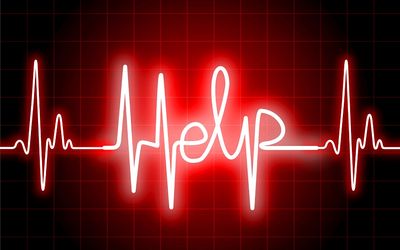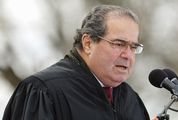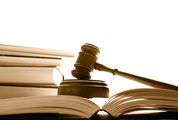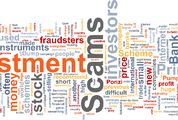SUE Chlebek was on her regular three-mile walk with a friend one spring morning when she told her companion she was so short of breath, she must be dominating the conversation.
About two hours later, she went into sudden cardiac arrest just seconds after arriving at a hospital emergency room. Doctors shocked her heart back into rhythm with a defibrillator and then deployed a stent to open a blocked artery.
About 1,000 Americans a day suffer sudden cardiac arrest, a catastrophic event that seems to come on without warning and almost always results in death unless help is nearby. Ms. Chlebek, a 56-year-old mother of three from Indiana was one of the lucky ones. When these scares happen outside the hospital, just more than 10% of people survive.
Now researchers say the events may not always be so sudden. A recent study that analysed 839 sudden cardiac arrests found that in 430 cases, or 51%, patients exhibited warning signs in the four weeks before the arrest. The victims either failed to recognise the symptoms or ignored them — in most cases until it was too late.
The missed symptoms included chest pain, shortness of breath, lightheadedness and heart palpitations — classic signs of an impending or actual heart attack. Researchers found evidence of them in medical records, interviews with family and witnesses to the arrest and in the recollection of those who survived. (Ms Chlebek was not a part of the study, but she now suspects the shortness of breath was an early warning.)
The findings reveal a "window of opportunity we didn’t know existed" for potentially preventing sudden cardiac arrests, says Sumeet S Chugh, associate director of the Heart Institute at Cedars-Sinai Medical Centre in Los Angeles, and senior author of the study.
While previous, smaller studies have shown that people have symptoms very shortly before an event, the idea that patients might experience precursor signs as much as a month in advance had not previously been documented, he says.
Millions of patients experience chest pain and other symptoms that end up having nothing to do with heart ailments. Even when cardiac problems are confirmed, tests to predict which patients are likely to end up in cardiac arrest are not available.
"The hours before sudden cardiac arrest are a large black box," says Benjamin Abella, clinical research director of the Centre for Resuscitation Science at the University of Pennsylvania, who was not involved with the new research. "This is one of the first studies to peer inside that black box."
But the results do not address a fundamental dilemma concerning heart symptoms: when people should call 911. Say someone has a brief episode of chest pain during exercise for the first time and goes without further symptoms and, after having no further symptoms, suffers sudden cardiac arrest three weeks later.
"Should that person have called 911 or sought assistance from his or her physician?" asks Roger White, an anaesthetist and cardiac arrest expert at Mayo Clinic. "That sort of question is left completely unanswered."
Dr Chugh agrees, adding that the findings do not mean every apparent sign of chest pain should prompt a 911 call. "That would create chaos," he says.
As part of what is known as the Oregon Sudden Unexpected Death Study, Dr Chugh and his colleagues are also gathering genetic data, autopsy findings and information from medical records. They aim to develop a clinical profile that describes who is most likely to benefit from making a 911 call. One hope is that such information might lead to personal technology that people could use to help gauge how to respond to symptoms. For instance, a smartphone app that records electrocardiograms could advise whether a patient is at immediate risk.
Another idea, researchers say, is a home test to measure troponins, which are proteins that, when detected in elevated levels in the blood, can indicate heart damage.
More research is needed to develop such tests and identify patients most likely to benefit. Meanwhile, the new findings are a reminder that people who experience unusual or repetitive symptoms of chest pain, shortness of breath or lightheadedness that go away quickly should call a doctor, Dr White says. If such signs persist for several minutes, even if they have not occurred before, "that is a mandatory moment to call 911".
Among the 430 patients in the study who had experienced symptoms, 911 was called in just 81, or 19%, of cases; 32% of those patients survived to be discharged from the hospital, compared with just 6% where no call was made.
Sudden cardiac arrest is the result of an electrical storm in the heart that causes it to abruptly stop beating. It is not the same as a heart attack, which is caused by obstructions in the blood vessels that feed the heart. As Ms Chlebek’s case illustrates, a major heart attack is a frequent cause of sudden cardiac arrest.
When she got home after that morning walk in March 2010, Ms Chlebek felt pain in her chest. She let her dogs out, changed out of her exercise clothes and had another sharp pain.
"I googled ‘chest pain‘," she recalls. "‘Heart attacks’ popped up."
She did not believe it. She was a few kilograms too heavy, but she was active, exercised regularly and ate well.
But after two more pain spikes, she decided to go the emergency room, opting to drive herself instead of calling 911. A block away from the hospital she had another attack of pain just as she reached a red light.
"I got a little panicky and decided to run the light," she says. She parked in front of the emergency room door, walked in and said: "I think I’m having a heart attack."
"What makes you think that?" an emergency room employee staffer asked. She never answered the question. Just as she was put in a wheelchair, she went into cardiac arrest without even giving her name. Her doctor later told her if she had not run the red light, she probably would not have survived.
Heart experts strongly recommend patients call 911 rather than drive or get driven privately. Ms Chlebek recommends 911 in talks she gives for the patient advocacy group WomenHeart. But she says she would not change what she did. "It worked out for me, just by seconds."
Dr Chugh’s paper, published in January in the Annals of Internal Medicine, is the latest of about 75 reports from the Oregon study, which he started 14 years ago and which involves 16 hospitals and 300 paramedics in greater Portland.
The idea for the study emerged from his experience as a surgeon who implants defibrillators in patients considered at risk of sudden death. A defibrillator "is your personal paramedic", he says, firing to shock your heart back into rhythm "within a few seconds instead of waiting for the ambulance".
Thousands of patients have been treated with the devices, but less than 5% of them fire each year, he says, suggesting that 95% of patients do not benefit. Yet more than 325,000 Americans suffer sudden cardiac arrest outside hospitals each year, according to the American Heart Association.
"There is no other disease in man where you have a 90% chance of dying in 10 minutes," he says.
More Africa news from The Wall Street Journal
More news from The Wall Street Journal
Premium access to WSJ.com: $1 a week for 12 weeks

Heart attack. Picture: ISTOCK
SUE Chlebek was on her regular three-mile walk with a friend one spring morning when she told her companion she was so short of breath, she must be dominating the conversation.
About two hours later, she went into sudden cardiac arrest just seconds after arriving at a hospital emergency room. Doctors shocked her heart back into rhythm with a defibrillator and then deployed a stent to open a blocked artery.
About 1,000 Americans a day suffer sudden cardiac arrest, a catastrophic event that seems to come on without warning and almost always results in death unless help is nearby. Ms. Chlebek, a 56-year-old mother of three from Indiana was one of the lucky ones. When these scares happen outside the hospital, just more than 10% of people survive.
Now researchers say the events may not always be so sudden. A recent study that analysed 839 sudden cardiac arrests found that in 430 cases, or 51%, patients exhibited warning signs in the four weeks before the arrest. The victims either failed to recognise the symptoms or ignored them — in most cases until it was too late.
The missed symptoms included chest pain, shortness of breath, lightheadedness and heart palpitations — classic signs of an impending or actual heart attack. Researchers found evidence of them in medical records, interviews with family and witnesses to the arrest and in the recollection of those who survived. (Ms Chlebek was not a part of the study, but she now suspects the shortness of breath was an early warning.)
The findings reveal a "window of opportunity we didn’t know existed" for potentially preventing sudden cardiac arrests, says Sumeet S Chugh, associate director of the Heart Institute at Cedars-Sinai Medical Centre in Los Angeles, and senior author of the study.
While previous, smaller studies have shown that people have symptoms very shortly before an event, the idea that patients might experience precursor signs as much as a month in advance had not previously been documented, he says.
Millions of patients experience chest pain and other symptoms that end up having nothing to do with heart ailments. Even when cardiac problems are confirmed, tests to predict which patients are likely to end up in cardiac arrest are not available.
"The hours before sudden cardiac arrest are a large black box," says Benjamin Abella, clinical research director of the Centre for Resuscitation Science at the University of Pennsylvania, who was not involved with the new research. "This is one of the first studies to peer inside that black box."
But the results do not address a fundamental dilemma concerning heart symptoms: when people should call 911. Say someone has a brief episode of chest pain during exercise for the first time and goes without further symptoms and, after having no further symptoms, suffers sudden cardiac arrest three weeks later.
"Should that person have called 911 or sought assistance from his or her physician?" asks Roger White, an anaesthetist and cardiac arrest expert at Mayo Clinic. "That sort of question is left completely unanswered."
Dr Chugh agrees, adding that the findings do not mean every apparent sign of chest pain should prompt a 911 call. "That would create chaos," he says.
As part of what is known as the Oregon Sudden Unexpected Death Study, Dr Chugh and his colleagues are also gathering genetic data, autopsy findings and information from medical records. They aim to develop a clinical profile that describes who is most likely to benefit from making a 911 call. One hope is that such information might lead to personal technology that people could use to help gauge how to respond to symptoms. For instance, a smartphone app that records electrocardiograms could advise whether a patient is at immediate risk.
Another idea, researchers say, is a home test to measure troponins, which are proteins that, when detected in elevated levels in the blood, can indicate heart damage.
More research is needed to develop such tests and identify patients most likely to benefit. Meanwhile, the new findings are a reminder that people who experience unusual or repetitive symptoms of chest pain, shortness of breath or lightheadedness that go away quickly should call a doctor, Dr White says. If such signs persist for several minutes, even if they have not occurred before, "that is a mandatory moment to call 911".
Among the 430 patients in the study who had experienced symptoms, 911 was called in just 81, or 19%, of cases; 32% of those patients survived to be discharged from the hospital, compared with just 6% where no call was made.
Sudden cardiac arrest is the result of an electrical storm in the heart that causes it to abruptly stop beating. It is not the same as a heart attack, which is caused by obstructions in the blood vessels that feed the heart. As Ms Chlebek’s case illustrates, a major heart attack is a frequent cause of sudden cardiac arrest.
When she got home after that morning walk in March 2010, Ms Chlebek felt pain in her chest. She let her dogs out, changed out of her exercise clothes and had another sharp pain.
"I googled ‘chest pain‘," she recalls. "‘Heart attacks’ popped up."
She did not believe it. She was a few kilograms too heavy, but she was active, exercised regularly and ate well.
But after two more pain spikes, she decided to go the emergency room, opting to drive herself instead of calling 911. A block away from the hospital she had another attack of pain just as she reached a red light.
"I got a little panicky and decided to run the light," she says. She parked in front of the emergency room door, walked in and said: "I think I’m having a heart attack."
"What makes you think that?" an emergency room employee staffer asked. She never answered the question. Just as she was put in a wheelchair, she went into cardiac arrest without even giving her name. Her doctor later told her if she had not run the red light, she probably would not have survived.
Heart experts strongly recommend patients call 911 rather than drive or get driven privately. Ms Chlebek recommends 911 in talks she gives for the patient advocacy group WomenHeart. But she says she would not change what she did. "It worked out for me, just by seconds."
Dr Chugh’s paper, published in January in the Annals of Internal Medicine, is the latest of about 75 reports from the Oregon study, which he started 14 years ago and which involves 16 hospitals and 300 paramedics in greater Portland.
The idea for the study emerged from his experience as a surgeon who implants defibrillators in patients considered at risk of sudden death. A defibrillator "is your personal paramedic", he says, firing to shock your heart back into rhythm "within a few seconds instead of waiting for the ambulance".
Thousands of patients have been treated with the devices, but less than 5% of them fire each year, he says, suggesting that 95% of patients do not benefit. Yet more than 325,000 Americans suffer sudden cardiac arrest outside hospitals each year, according to the American Heart Association.
"There is no other disease in man where you have a 90% chance of dying in 10 minutes," he says.
More Africa news from The Wall Street Journal
More news from The Wall Street Journal
Premium access to WSJ.com: $1 a week for 12 weeks





















Change: 1.94%
Change: 2.37%
Change: 3.15%
Change: 1.67%
Change: 2.98%
Data supplied by Profile Data
Change: 3.08%
Change: 2.00%
Change: 1.94%
Change: 0.00%
Change: 1.95%
Data supplied by Profile Data
Change: 0.07%
Change: 0.04%
Change: -0.29%
Change: -0.14%
Change: 0.23%
Data supplied by Profile Data
Change: -1.97%
Change: -1.57%
Change: -2.86%
Change: -0.19%
Change: -0.18%
Data supplied by Profile Data